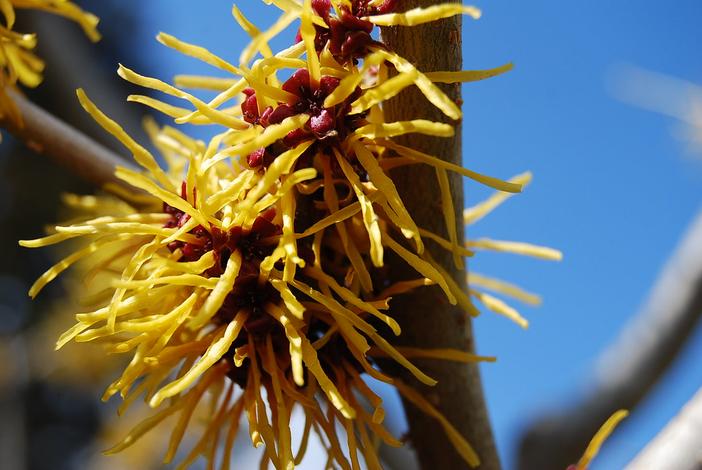Japanese Witch-Hazel
(Hamamelis japonica)
Japanese Witch-Hazel (Hamamelis japonica)
/
/

arditpg
CC BY 2.0
Image By:
arditpg
Recorded By:
Copyright:
CC BY 2.0
Copyright Notice:
Photo by: arditpg | License Type: CC BY 2.0 | License URL: https://creativecommons.org/licenses/by/2.0/ | Uploader: arditpg | Publisher: Flickr































Estimated Native Range
Summary
Hamamelis japonica, commonly known as Japanese witch-hazel, is a deciduous shrub or small tree native to the forest margins, hillsides, and stream banks of Japan. It typically grows to a height of 10-15 feet (3-4.5 meters) and a similar width, with a spreading, irregular form that adds visual interest to the landscape. The plant is renowned for its slightly fragrant, bright yellow flowers that bloom from late winter to early spring, often while the branches are still bare, providing a welcome splash of color during the colder months. The flowers have narrow, ribbon-like petals and are quite showy. After flowering, it produces broad, ovate green leaves that turn an attractive yellow in the fall, contributing to its ornamental value.
Japanese witch-hazel is valued for its winter interest, cold-hardiness, and the unique timing of its blooms. It is often used in gardens for its ornamental flowers and as a specimen or accent plant. In cultivation, it prefers full sun to part shade, well-drained acidic to neutral soil, and moderate water. It is relatively low maintenance but may require occasional pruning to maintain its shape. Japanese witch-hazel is also resistant to many pests and diseases, making it a robust choice for gardeners. It is the parent of the popular Hamamelis × intermedia hybrids, which are widely planted for their larger and more colorful flowers.CC BY-SA 4.0
Japanese witch-hazel is valued for its winter interest, cold-hardiness, and the unique timing of its blooms. It is often used in gardens for its ornamental flowers and as a specimen or accent plant. In cultivation, it prefers full sun to part shade, well-drained acidic to neutral soil, and moderate water. It is relatively low maintenance but may require occasional pruning to maintain its shape. Japanese witch-hazel is also resistant to many pests and diseases, making it a robust choice for gardeners. It is the parent of the popular Hamamelis × intermedia hybrids, which are widely planted for their larger and more colorful flowers.CC BY-SA 4.0
Plant Description
- Plant Type: Shrub, Tree
- Height: 10-15 feet
- Width: 10-15 feet
- Growth Rate: Moderate
- Flower Color: Yellow
- Flowering Season: Winter, Spring
- Leaf Retention: Deciduous
Growth Requirements
- Sun: Full Sun, Part Shade
- Water: Medium
- Drainage: Medium
Common Uses
Border Plant, Fragrant, Low Maintenance, Showy Flowers, Street Planting
Natural Habitat
Forest margins, hillsides, and stream banks in Japan
Other Names
Common Names: Asian witch hazel, Mansaku
Scientific Names: , Hamamelis japonica, Hamamelis arborea, Hamamelis arborea, Hamamelis bitchuensis, Hamamelis flavopurpurascens, Hamamelis incarnata, Hamamelis japonica f. auriflora, Hamamelis japonica f. discolor, Hamamelis japonica f. discolor
GBIF Accepted Name: